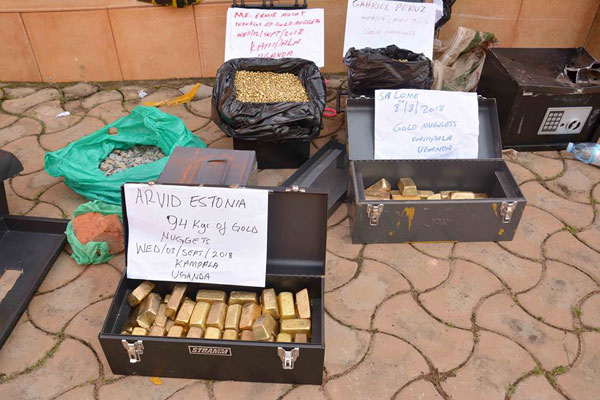Uganda’s shadowy gold trade has once again come under scrutiny after authorities dismantled a $70,000 scam targeting a Nigerian investor. The sting, carried out by the State House Anti-Corruption Unit (SH-ACU) and the Criminal Investigations Directorate, shines a spotlight on how fraudsters continue to exploit the region’s lucrative but poorly regulated precious metals market.
The victim, Nigerian businessman Mark Gbillah, was lured by promises of seven kilograms of gold from two purported suppliers — Legacy Refinery Limited and Emerod Agency Limited. Investigators say both companies were fictitious fronts run by a network of four Congolese and three Ugandan nationals.
On August 12, Gbillah worked with SH-ACU to stage a meeting that led to the immediate arrest of the suspects before they could solicit more money. A raid on a property in Muyenga, an affluent Kampala suburb, uncovered about 150 kilograms of fake gold bars and imitation nuggets — tools of deception allegedly meant to entice additional victims.
This is not an isolated incident. Similar cons have been unfolding across East Africa, costing investors millions. Between early 2021 and March 2022, at least $25 million was lost to gold scams in Uganda and Kenya alone. Some single cases reached as high as $8 million.
Earlier this year, a Turkish investor lost $150,000 in a comparable operation, while another businessman was defrauded of $105,000 in mid-2024. Experts say weak oversight, informal trading systems, and soaring global demand make the gold sector a magnet for criminal syndicates.
Authorities stress that the latest arrests are unusual because the suspects were caught mid-deal — a move they hope will send a strong warning to potential fraudsters. They are urging prospective buyers to conduct rigorous background checks and confirm transactions with official channels before parting with their money.
The seven suspects remain in custody and are expected to face formal charges in the coming days, as Uganda battles to restore trust in its gold trade and shield investors from an ever-evolving web of scams.


